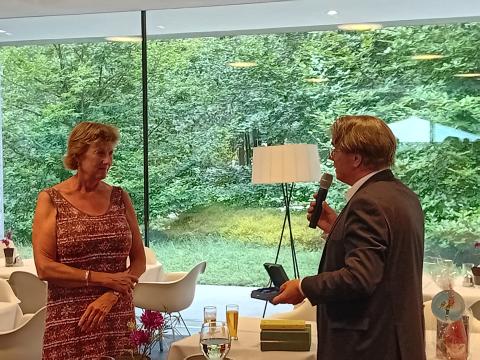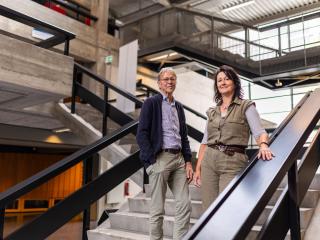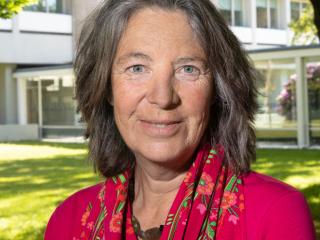Mies Hezemans retires as dean of students
Mies Hezemans has been active on the Tilburg University campus for 36 years, for most of the time as a dean of students. In all those years, not only the work has changed. So have the students.
“There was no work for me in the field I trained for,” says Mies Hezemans, until recently dean of students at Tilburg University. “In the 1980s, I took an Arts program and worked in England for a year. Before that I had completed a librarian program at a university of applied sciences in Tilburg. I had planned to continue my studies in Utrecht, but then the Language and Literature program in Tilburg started and it appealed to me. Fortunately, I could continue to rent my former student room, so it was as if nothing had changed.”
“During my studies, I worked at the regional office for student grants and loans (steunpunt student studiefinanciering). A new student grants and loans system had been introduced in 1986 and it was a great mess.” A year later, a dean of students job became available. Mies applied and was hired, also because of her extensive knowledge on students grants, which was the major part of the job at the time.
Remit
“I already knew most of my colleagues. When I started my librarian program in 1979, we could participate in a student introduction program, organized by two Economics students. A month later, a teacher in our class said: 'They are looking for people to help organize the next introduction program.’ We thought we could do a much better job, so we joined the TIK, the Tilburg Introduction Commission. It is now called TOP (Tilburg Orientation Program, ed.). The Commission came under the Student Affairs Office. Years later, I worked at this same unit as a dean of students.”
The work is very broad, just as broad as you choose to make it, or the organization allows you to make it
The dean of students provides information, advice, and guidance to students, about their legal position, wellbeing, health care, choice of program, study methods. The dean of students also guides students who have incurred study delay as a result of special circumstances, such as illness or the death of a parent. And he or she also makes recommendations relating to the binding study advice. Mies: “I roughly knew what the job entailed, but I had not thought about the remit. The work is very broad, just as broad as you choose to make it, or the organization allows you to make it. Tilburg was originally a small-scale university. At large universities, there were all kinds of commissions that actively wanted to have their say. In Tilburg, nothing stood in the way of prompt action.”
Mies knew exactly how it worked
“A large part of my time was spent on student grants and loans. DUO (Dienst Uitvoering Onderwijs, the government’s Education Implementation Service) had mandated us to make arrangements. As a result, we were able to grant additional funding to students who had incurred delay or were not financially supported by their parents. I knew exactly how everything worked. I consulted with the DUO management as a representative of the deans of students at all Dutch universities. A lot was possible in the way of tailored solutions, but many students did not know this. As a dean of students, you need to know the law and the regulations but the job also has less formal aspects. Students often come with question A, but they are really looking for the answers to questions B and C. There is often a bunch of related questions. The dean of students does not deal with matters of harassment or mental distress, but we do know who to refer students to.”
If there is a disaster or there has been an accident, you can be sure that a student is directly or indirectly impacted
“What has increased enormously is the number of students with special needs. At a certain point, pupils with dyslexia or PDD-NOS could get support that suddenly enabled them to graduate from high school and go to university after all. As a result, we also had to make facilities available and make special examination arrangements. If something is going on in students’ lives that may cause study delay, they need to report it to the dean of students. We then explore how we can accommodate a student and what can be done financially. We stop at hardly anything.
Everything you read in the newspapers has links to the student community. If there is a disaster or there has been an accident, you can be sure that a student is directly or indirectly impacted. But our work is also about minor tragedies: a falling out with a landlord, a relationship that has ended, coming out. As a dean of students, you come across every conceivable hitch in the study process.”
There are approximately sixty deans of students at the Dutch universities. For a long time, Mies did all the work together with one colleague; at the moment, there are six part-time Deans. In addition, numerous academic counselors are active, there are various confidential advisors, a student psychologist, and a student chaplain.
Not only the work changed
Mies: “There is a bigger mix of questions. Of course, there are a lot more students now, also many international students. That has also had its effect: they have different issues. If they have a problem, it usually has many ramifications. Students from outside Europe pay enormous fees, so they only want to study hard. Anything that comes in the way of that is immediately a big problem. If war breaks out, or there has been an earthquake, it has a knock-on effect for a number of students at our university. Then all sorts of things need to be arranged very quickly. We know have scenarios and protocols for these kinds of emergencies.”
But not only the work changed. So did the students, over the years. “They are all working now. And work is more important than studies. And they all feel that notorious study pressure or pressure to perform. I find it hard to assess to what extent that is a real problem or whether students are merely parroting each other. It is my professional bias of course: I only saw students with issues, about 2000 every year. Usually they were students from less supportive environments, in a material and an immaterial sense. Sometimes parents cannot contribute, some parents are unwilling to contribute, or they pass away. These are dreadful tragedies.
But there are also students who put a lot of pressure on themselves. Girls who fall apart if they “only” score a seven. Well, yes, it is something you have to deal with. In such a case, we refer students to training by the student psychologists, such as Positive perfectionism. Of course, universities contribute to that pressure. They want to produce the best graduates, but a number of universities has recently discontinued the designation cum laude. However, I think you have to strike a sensible balance. You want to be careful not to stimulate unhealthy competition and the negative mindsets it creates. At the same time, there will always be students who want to go the extra mile and who want to see their efforts reflected in their grades. And there are students who couldn’t care less. I think it is great if someone graduates with distinction but I would not judge someone for not achieving that level. I therefore do not think that academic recognition of exceptional academic achievement should be abolished. After all, students who graduate with distinction can be role models. Good students encourage the weaker students. This is also why I favor broader training, where all students are taught together for the first three years, regardless of their levels.”
I really do think it’s a shame to pass up that first-hand opportunity to experience life as a student.”
Get together!
Recent research by the Trimbos Institute (Netherlands Institute of Mental Health and Addiction) suggests that 50% of students experience feelings of anxiety and depression, and that 80% feel lonely. What is Mies’ take on this?
“I have my doubts about the representativeness of those surveys. I suspect that they are filled out by students who have it really bad. This is a very difficult matter. At the same time, I see that students are young and want to do things and explore. Their phones show them a picture of a world in which everyone is better than they are. If you ask me, I think students would be a lot better off if they just ignore that phone now and then. And go out and get together! Covid has also shown us that it was fine with many students to take online classes. Then we said: we are going to do everything in person again. On campus, students run into each other and off campus there are lots of opportunities for social interaction as well. They can join a student or study association. They can go to the gym or do something creative like amateur dramatics. It is all out there. But I sense a kind of lack of confidence. A good many students prefer to continue living with their parents. I really do think it’s a shame to pass up that first-hand opportunity to experience life as a student.”
Mies does not beat about the bush. In her years as a dean of students, she was never one to mince words. “When the rector presented the Tilburg University Medal, he said: ‘You were straightforward in telling students they couldn’t always get what they wanted.’ I am notoriously outspoken. And I don’t have much patience with people who do not think for themselves. When I find myself opposite a shiftless student, I think: studying is not an obligation, you know. Apparently, the idea has taken root that if you have successfully completed pre-university education, you must go to university. I see it differently. Go and work, go travel the world, go do something that is close to your heart, and do not come back until you know what you want to do.”

When the rector presented the Tilburg University Medal, he said: ‘You were straightforward in telling students they couldn’t always get what they wanted.'
“Everyone you meet is fighting a battle you know nothing about. Be kind. Always”
Mies has not one, but even two chairs in the University Fund's Have a Seat scholarship programme. "My slogan simply didn't fit on one seat: 'Everyone you meet is fighting a battle you know nothing about. Be kind. Always'. I am very supportive of the University Fund. As a student dean, I have been able to help international students in great difficulty on several occasions with the help of the university fund. They have no study financing or borrowing options, have to pay for everything themselves and especially students from outside Europe pay a lot of tuition fees. If, with a lot of effort and help from family, friends or sometimes even half the village, they have that money together and something unexpected happens, e.g. a parent in hospital, or war suddenly breaks out in the home country causing parents to lose their jobs, they immediately have a big problem. But promising students from other continents, who are not born into a well-spread bed, can also study here through this fund and thus make a difference later in their home countries. These students are super motivated, have to overcome so much, I have a lot of respect for that".
Across the board, I can look back on 36 good years. It was a fine, multifaceted working environment. I had wonderful colleagues and I have helped many young people on their way
End of an era
On September 1 of this year, Mies Hezemans retired as a dean of students at Tilburg University. She will use the coming year to see what she would like to do next in her working life. “I’ve had about enough. After Covid, things just weren’t the same anymore. There is lots more paperwork now, a lot more red tape. Across the board, I can look back on 36 good years. It was a fine, multifaceted working environment. I had wonderful colleagues and I have helped many young people on their way. As a dean of students, you have an independent position. We ask the critical questions and aren’t satisfied with the easy answers. Once I advised a student to claim damages from the university. Would I have wanted to be a student today? That is hard to say because I know what it used to be like. When you are young, you just go along with what presents itself. To be honest, I couldn’t bear the thought of having to do everything by computer and to be under so much pressure. And all those online platforms. Take Magister. As a secondary school pupil, you cannot even play hooky without your parents knowing. Awful!”
About Mies Hezemans
Mies Hezemans studied Language and Literature at Tilburg University between 1984 and 1990. She was a member of TIK, the commission organizing the introduction days for first-year students. After her studies, she became a dean of students in 1992. In that capacity, she represented the deans of students of all Dutch universities in consultations with DUO (Dienst Uitvoering Onderwijs, the government’s Education Implementation Service). In September 2023, Mies retired, making her the longest-serving dean of students at Tilburg University. On the occasion of her farewell, she received the University Medal for her special services to the university.
Date of publication: 8 November 2023



